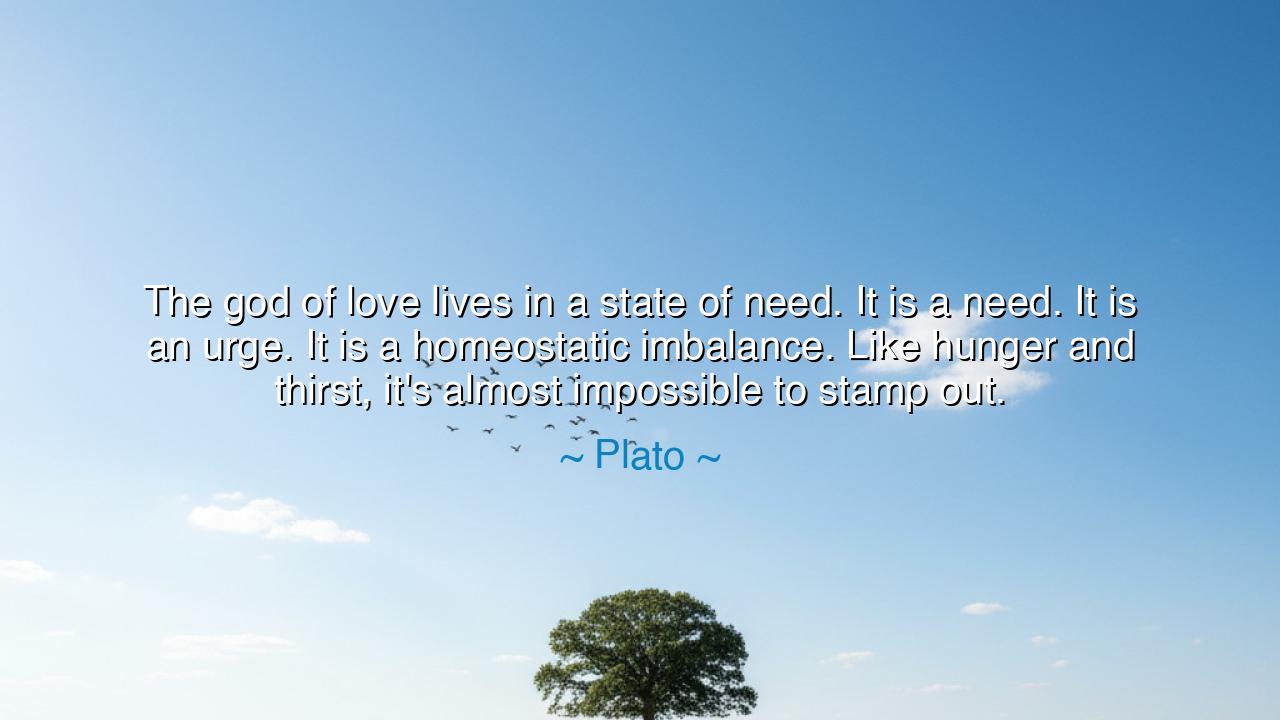
The god of love lives in a state of need. It is a need. It is an
The god of love lives in a state of need. It is a need. It is an urge. It is a homeostatic imbalance. Like hunger and thirst, it's almost impossible to stamp out.






“The god of love lives in a state of need. It is a need. It is an urge. It is a homeostatic imbalance. Like hunger and thirst, it’s almost impossible to stamp out.” — Plato
Thus spoke Plato, the philosopher of Athens, the seeker of eternal forms and truths. In this profound utterance, he unveils one of the most powerful mysteries of human existence: that love, which we so often glorify as divine and transcendent, is born from need — from the emptiness that yearns to be filled, from the incompleteness that longs for wholeness. The god of love, whom the Greeks named Eros, is not perfect or content, but restless and desiring. He dwells forever in the space between poverty and plenty, hunger and satisfaction, seeking endlessly what he does not possess.
In Plato’s Symposium, this idea is revealed through the wise words of Diotima, the prophetess who teaches Socrates that Eros is the child of Poros (resource) and Penia (poverty). From his father, he inherits desire, inventiveness, and strength; from his mother, he inherits lack, longing, and need. Thus, love is both rich and poor, both full and empty, both divine and human. Love is the tension between what we have and what we seek. It is a bridge between the mortal and the eternal, a fire that drives us to create, to seek beauty, to transcend ourselves.
Plato saw that the hunger of love is not a weakness, but the very pulse of life. Without it, there would be no art, no discovery, no tenderness, no birth. Just as the body cannot live without food or water, the soul cannot live without love. And yet, this need is never fully satisfied — for every moment of union fades, every embrace passes, every beauty glimpsed vanishes into memory. Love, therefore, is eternal not because it is fulfilled, but because it cannot be. It is the unending quest of the soul toward what it imagines as completion.
In history, this truth reveals itself again and again. Consider Beethoven, who poured his unfulfilled love into the immortal notes of his symphonies. Though he never found peace in romance, his longing gave birth to music that still moves the hearts of humankind. His passion, denied satisfaction, was transformed into creation — proof that the god of love, living in need, drives the spirit toward greatness. So too did Michelangelo, whose unspoken desires became marble and fresco, beauty carved out of yearning. Their art was not born of contentment, but of hunger — a hunger that refused to die.
Plato’s teaching reminds us that love is not merely a feeling of comfort or pleasure. It is a force of nature, wild and relentless, that pushes us toward the divine. When we love, we are made aware of our incompleteness — we feel the ache of separation, the burning to become one with another being, or with the beauty that haunts our imagination. Yet, this ache is sacred. It reminds us that we are alive, that we are striving creatures who seek the infinite. To love is to dwell perpetually between heaven and earth — never fully satisfied, yet never ceasing to reach.
And so, do not curse your longing, my child of the ages. Do not despise your ache for connection, your hunger for meaning. The god of love lives within that need. It is not a flaw, but a divine fire. Embrace it, for it is the force that binds the stars and moves the heart of humankind. The one who no longer feels desire has ceased to grow; the one who still hungers is still becoming.
Therefore, the lesson is this: love is not to be conquered, but understood. Feed it wisely, and let it lift you higher — into compassion, into creation, into the beauty that lives beyond flesh. When you feel the ache of absence, remember Plato’s wisdom: that such hunger is the sign of your soul reaching for the eternal. For the god of love will never die within you — he will live in your longing, whispering always that to need is to live, and to love is to become divine.






AAdministratorAdministrator
Welcome, honored guests. Please leave a comment, we will respond soon